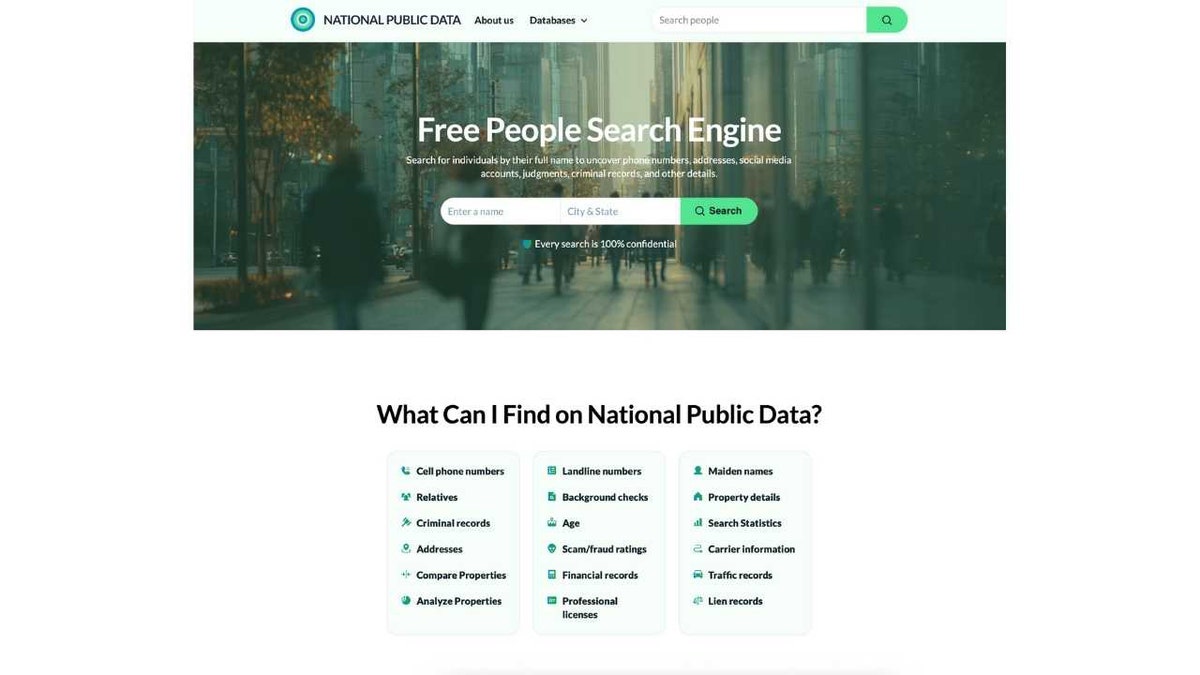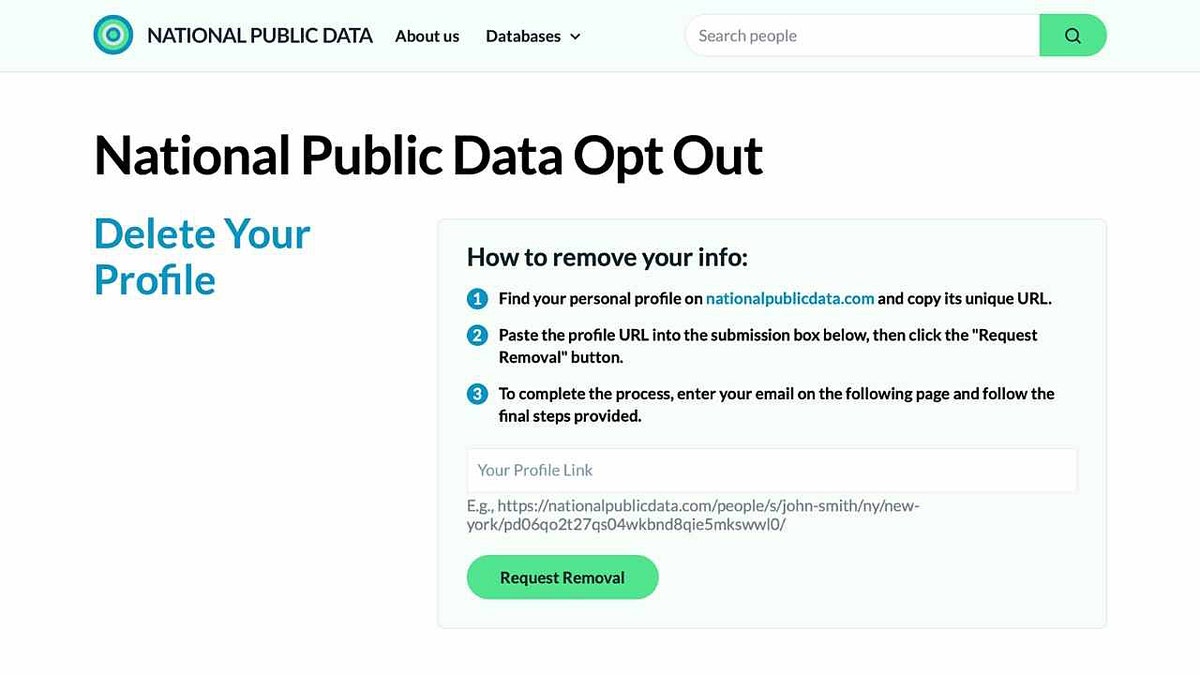NEWYou can now listen to Fox News articles!
Over a year ago, National Public Data (NPD) made headlines for one of the largest breaches in history. The people-search site exposed the personal information of 3 billion individuals. After disappearing from the internet, the site has returned under new ownership, sparking fresh concerns about privacy.
Sign up for my FREE CyberGuy Report
Get my best tech tips, urgent security alerts and exclusive deals delivered straight to your inbox. Plus, you’ll get instant access to my Ultimate Scam Survival Guide — free when you join my CyberGuy.com newsletter.
Who owns National Public Data now?
NPD has relaunched under Perfect Privacy LLC, a company that sounds protective but is not affiliated with the VPN service of the same name. Despite the new name behind the scenes, the business model has not changed. The site still allows anyone to look up personal data about friends, relatives or strangers with just a name.
MAJOR DATA BROKER HACK IMPACTS 364,000 INDIVIDUALS’ DATA
Although NPD includes disclaimers about the Fair Credit Reporting Act (FCRA), nothing prevents users from misusing this data when making decisions about employment, housing or credit.

National Public Data, a people-search site, exposed the personal information of 3 billion individuals in one of the largest breaches ever. (NPD)
Accuracy issues and data sources
According to NPD, the data comes from public records, property ownership databases, social media and government agencies. The company claims to verify and filter this information to ensure it is accurate and up-to-date. However, users may find that profiles still contain mistakes.
A quick test search revealed a mix of outdated and accurate information. The site struggled with hyphenated names but pulled up correct details in other cases.
We reached out to NPD for a comment, but did not hear back before our deadline.

A woman searches for herself online. (Kurt “CyberGuy” Knutsson)
How to remove your information from NPD
If you prefer not to have your information available on NPD’s site, you can request removal directly:
- Search your name on nationalpublicdata.com.
- Open your profile and copy its URL.
- Visit nationalpublicdata.com/optout.html.
- Paste the URL into the “Your Profile Link” field.
- Enter your email address to confirm deletion.
Keep in mind that each profile needs its own request and confirmation email. After you submit, check back in a few days to make sure your data is actually gone.
Pro tip: Use an alias or disposable email address for these requests. This makes it easier to track confirmations and keeps your main inbox clear.
For recommendations on private and secure email providers that offer alias addresses, visit CyberGuy.com.

NPD offers an opt-out function for users who prefer not to have their information available on the site. (NPD)
Why NPD is only part of the problem
Removing your information from National Public Data is only the beginning. Dozens of other people-search sites may still display your personal details. Many of these platforms pull from the same public databases, which means your address, phone number or relatives’ names can keep reappearing.
The return of NPD shows how quickly data can resurface online. A breach may fade from the headlines, but the exposed information rarely disappears. To protect your privacy, you need a broader plan.
1) Regularly check for your data
Start by searching for your name on people-search engines several times a year. Look beyond NPD. Sites like Whitepages, Spokeo and Radaris often host similar data. Regular checks help you spot new profiles before they spread further.
STOP DATA BROKERS FROM SELLING YOUR INFORMATION ONLINE
2) Use a personal data removal service
A removal service can save time by scanning hundreds of databases at once. These services request opt-outs on your behalf and track new listings. While no service can guarantee the complete removal of your data from the internet, a data removal service is really a smart choice. They aren’t cheap, and neither is your privacy. These services do all the work for you by actively monitoring and systematically erasing your personal information from hundreds of websites. It’s what gives me peace of mind and has proven to be the most effective way to erase your personal data from the internet. By limiting the information available, you reduce the risk of scammers cross-referencing data from breaches with information they might find on the dark web, making it harder for them to target you.
Check out my top picks for data removal services and get a free scan to find out if your personal information is already out on the web by visiting CyberGuy.com.
Get a free scan to find out if your personal information is already out on the web: CyberGuy.com.
3) Monitor your accounts closely and use strong antivirus software
Protecting your privacy goes beyond deleting profiles. Keep an eye on your bank statements, credit reports and online accounts. Criminals can use exposed data for phishing attempts, fake loan applications or identity theft. Monitoring activity gives you an early warning if something looks suspicious.
The best way to safeguard yourself from malicious links that install malware, which could potentially access your private information, is to have strong antivirus software installed on all your devices. This protection can also alert you to phishing emails and ransomware scams, keeping your personal information and digital assets safe.
Get my picks for the best 2025 antivirus protection winners for your Windows, Mac, Android and iOS devices at CyberGuy.com.
4) Set up alerts for your identity
Many banks and credit monitoring services let you create alerts for suspicious activity. You can also set up free fraud alerts with the credit bureaus. These warnings tell lenders to take extra steps to verify your identity before issuing new credit.
Identity theft companies can monitor personal information like your Social Security Number (SSN), phone number and email address, and alert you if it is being sold on the dark web or being used to open an account. They can also assist you in freezing your bank and credit card accounts to prevent further unauthorized use by criminals.
See my tips and best picks on how to protect yourself from identity theft at CyberGuy.com.
5) Remove data at the source
People-search sites often pull records from government databases. Review your local county’s property, court or voter registration records. Some jurisdictions allow you to request redactions or limit what is shown online.
6) Lock down your social media
Since NPD and similar sites scrape from social media, tighten your privacy settings. Limit what strangers can see on Facebook, LinkedIn and other platforms. The less public information you share, the less these databases can collect.
CLICK HERE TO GET THE FOX NEWS APP
Kurt’s key takeaways
The return of National Public Data is a reminder that your personal information can resurface at any time. Even if you remove yourself from one site, dozens more may still hold your details. That is why protecting your privacy requires more than a quick opt-out. With regular checks, credit freezes and stronger account monitoring, you can reduce your risk and stay one step ahead.
Do you think stronger laws should be in place to stop companies from collecting and selling personal data, or is it up to individuals to protect themselves? Let us know by writing to us at CyberGuy.com.
Sign up for my FREE CyberGuy Report
Get my best tech tips, urgent security alerts and exclusive deals delivered straight to your inbox. Plus, you’ll get instant access to my Ultimate Scam Survival Guide — free when you join my CyberGuy.com newsletter.
Copyright 2025 CyberGuy.com. All rights reserved.








